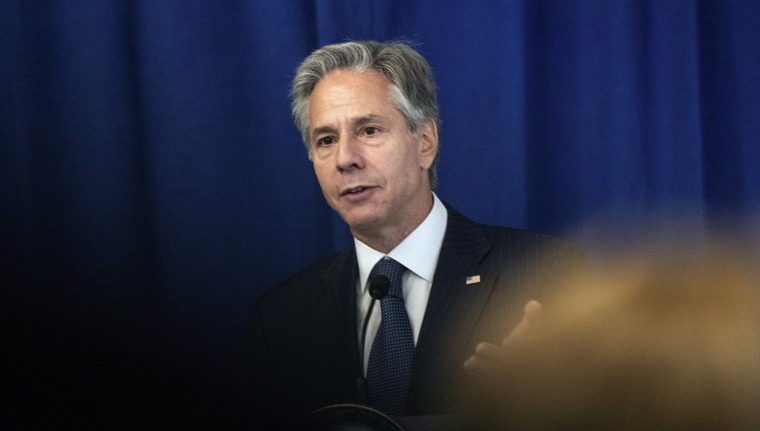There are no plans to change sanctions against Venezuela without concrete steps from the country’s president, Nicolás Maduro, Secretary of State Antony Blinken said Wednesday as pressure mounts for the U.S. to ease oil sanctions and stem soaring migration to the U.S.
The Biden administration has been looking at scaling back sanctions and allowing Chevron, the last U.S. company producing oil in Venezuela, to resume exports to the U.S. In exchange, Maduro’s government would have to resume talks with the opposition.
There is growing urgency for a deal to be made after OPEC+, of which Venezuela is a member, announced last week it would cut its oil production. Venezuela has the world’s largest proven oil reserves.
“We will review our sanctions policies in response to constructive steps from the regime,” Blinken said at a roundtable discussion with a handful of reporters to mark Hispanic Heritage Month. “The sanctions are ... a means to encourage a change in approach or change in policies from the Maduro regime.
“At the same time, we will also review and, if necessary, recalibrate our approach — including our sanctions — if we see additional repression, as opposed to progress,” Blinken said.
President Joe Biden has taken a different approach to Venezuela from that of former President Donald Trump, who sanctioned the state-run oil company, PDVSA, in 2019 and banned all oil imports from Venezuela. It was an attempt to topple Maduro as the country was near collapse.
Removing oil sanctions, which Venezuelan Americans generally oppose, could help stabilize the Venezuelan economy and stem the flow of migrants.
“My hope would be that the Maduro regime re-engages in a meaningful way and we can actually put the country back on the track to democracy and, at the same time, help alleviate the humanitarian situation ... almost catastrophic humanitarian environment that has caused so many Venezuelans to flee their own country,” Blinken said.
The Biden administration is under fire to ease the soaring number of migrants crossing the U.S.-Mexico border. The number of encounters with Venezuelans from October 2021 to August was over 150,000.
The administration is considering a humanitarian parole program for Venezuelans similar to the one offered to Ukrainians. The program would allow family members or sponsors in the U.S. to apply on behalf of refugees and commit to provide financial support while they are in the U.S.
“We continue to look for ways to expand legal pathways to the United States, as well as to rebuild our refugee program that has been decimated in recent years,” Blinken said.
U.S. still considering aid to Cuba
The number of Cuban migrants has reached a record, with close to 200,000 encounters at the border from October 2021 to August. Coast Guard crews have intercepted several thousand Cubans making perilous attempts at sea to reach the U.S.
Cuba, which has not been taking people deported from the U.S., has been devastated by an economic crisis compounded by its Soviet-style centrally planned economy, decades of U.S. sanctions and the effects of the coronavirus pandemic on tourism. Authorities heavily cracked down on protesters during historic demonstrations in July 2021.
Cuba recently made a rare request for U.S. aid after Hurricane Ian devastated parts of the island. The entire country lost power, and pockets of protests erupted islandwide; authorities cracked down on some protesters.
The Biden administration has had conversations with the Cuban government about Cuba’s needs and its request for aid. Blinken would not say what kind of aid was requested or what the U.S. would be willing to provide.
“I can’t get into any details of what we’re looking at, in terms of potential assistance, in the wake of the hurricane,” Blinken said. “We’re looking at it. And as I noted, we do everything possible to make sure that irrespective of our relationship with a given country ... we find ways to provide humanitarian assistance when and where it’s needed.”
Biden has made some adjustments to Cuba policy after Trump rolled back President Barack Obama’s historic restoration of diplomatic relations with the communist country. Biden increased the number of commercial flights to the island, lifted a Trump-era cap that limited remittances to $1,000 every three months and expanded the categories that allow U.S. citizens to travel there. He also beefed up capacity at the embassy and reinstated the family reunification parole program.
Blinken emphasized the Los Angeles Declaration on Migration and Protection, which was signed during the Summit of the Americas in June. It is a regional partnership to address historic migration flows affecting most countries in the region.
"There's a genuine sense of shared responsibility across the hemisphere for dealing with the migration challenge. That's from the countries of origin, the countries of transit, countries of destination, like the United States," Blinken said.
Follow NBC Latino on Facebook, Twitter and Instagram.

